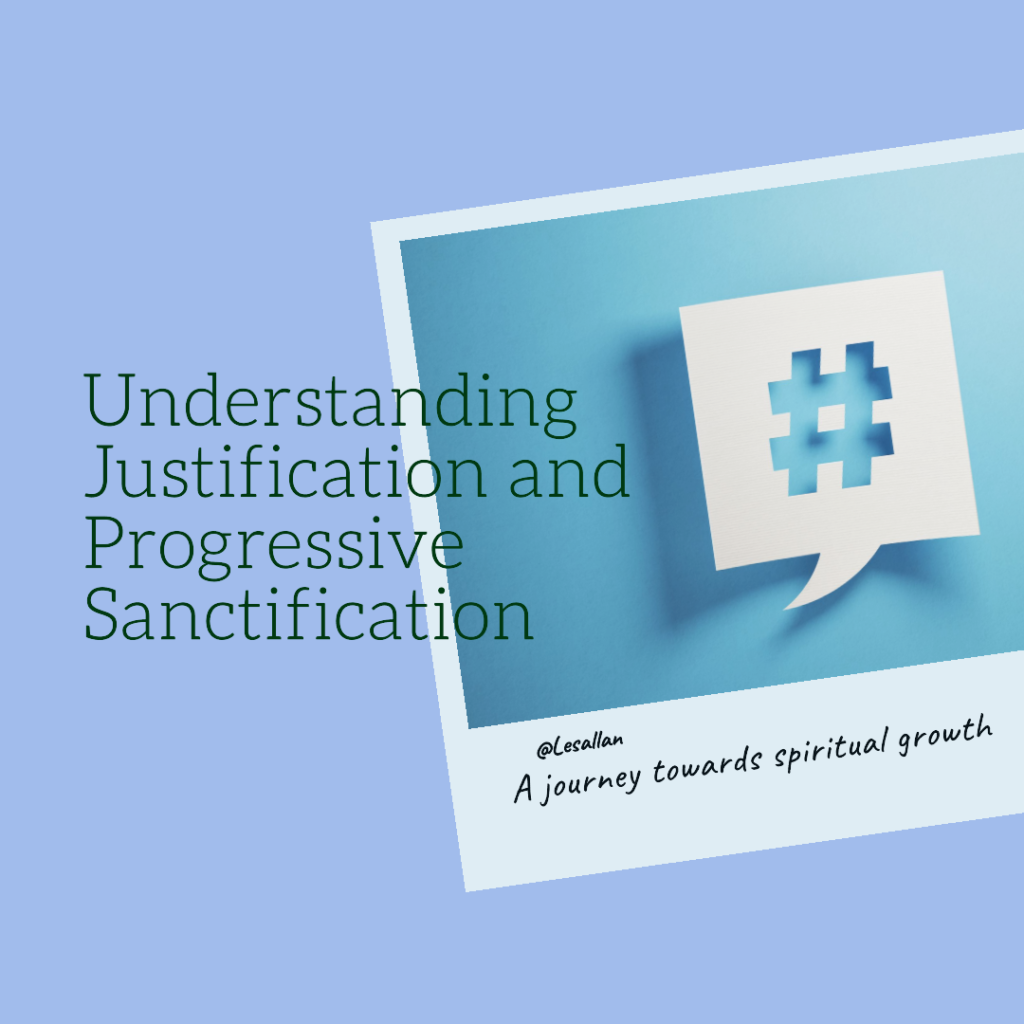Written By Lesallan

Justification and Progressive Sanctification
Written By Lesallan
Ohio Christian University
THE4050 Investigating Christian Theology II (ONFL23)
Professor Jeremy Kamer
October 16, 2023
Justification and Progressive Sanctification
Theological scholars have yet to explore the connection between sanctification and justification fully. It is a question that many Christians grapple with, especially given the challenges of modern society. However, it is crucial to understand that both stem from the same fundamental Christian beliefs of Christ’s substitutionary atonement and the believer’s union with Christ (Mayhue, 2010). As Oden (2009) notes, justification and sanctification are two facets of salvation through grace and faith. Justification is God’s initial act of declaring the sinner righteous, while sanctification is the ongoing transformation of the sinner into the likeness of Christ. Both rely on Christ’s death and resurrection and are received through faith alone. Sanctification requires the believer’s cooperation with the Holy Spirit to cultivate holiness and obedience.
How do we balance the assurance of our salvation by grace through faith with the call to grow in holiness and obedience to God’s will? How do we avoid the extremes of legalism and antinomianism, which can distort the gospel and hinder our spiritual growth? The answer, as always, is found in Scripture. The Bible teaches us that justification and sanctification are aspects of God’s saving work in our lives, but they are different. Justification is God declaring us righteous based on Christ’s death and resurrection. It is a one-time event when we believe in Jesus as our Lord and Savior. It is not based on our works or merits, but on God’s grace and mercy. Justification gives us peace with God, access to his presence, and the hope of eternal life.
Further exploration of this relationship could provide valuable insights into the process of sanctification and its role in the Christian life. On the other hand, sanctification is the process of God making us more like Christ in our character and conduct. It is an ongoing work that begins at regeneration and continues until glorification. It is based on our cooperation with the Holy Spirit, who works in us to produce the fruit of righteousness. Sanctification involves our daily repentance, renewal, and obedience to God’s commands. Sanctification gives us joy, growth, and witness in the world.
Scriptural verses have been analyzed to support the correlation between justification and sanctification. To illustrate, Romans 5:1-5 (KJV) states that faith-based justification grants us peace with God, entrance into his grace, the expectation of his glory, the ability to endure suffering, and the Holy Spirit’s outpouring of love into our hearts. Ephesians 2:8-10 tells us that we are saved by grace through faith, not by deeds, but that we are established in Christ Jesus for good deeds that God predestined us to perform. Philippians 2:12-13 instructs us to pursue our salvation with reverence and awe, recognizing that God operates within us to achieve his good intentions. Hebrews 12:1-2 advises us to persevere in the race set before us, fixing our gaze on Jesus, the originator and perfecter of our faith. 1 John 1:9 proclaims that if we confess our sins, God is righteous, merciful, and purifies us from all unrighteousness. All of these biblical passages demonstrate the relationship between justification and sanctification.
The relationship between justification and sanctification is not one of opposition or competition, but of harmony and complementarity. They (the relationships) are essential for our salvation and God’s glory. They are both gifts of God’s grace that we receive by faith. They are both motivated by God’s love that we experience in Christ. They are both aimed at conforming us to God’s image and will. Therefore, as Christians living in the world today, we should not separate or confuse justification and sanctification but embrace and pursue them both. We should not rest on our justification as an excuse for sin or complacency, but use it as a basis for gratitude and service. We should not rely on our sanctification as a ground for pride or self-righteousness, but recognize it as a sign of God’s grace and power. We should not neglect our justification or sanctification, but cherish them as expressions of God’s love and purposes for us.
The text above explains the Christian faith’s relationship between justification and sanctification. Justification is God declaring us righteous in his sight based on Christ’s death and resurrection, while sanctification is the process of God making us more like Christ in our character and conduct. Both are essential for our salvation and God’s glory, and they are both gifts of God’s grace that we receive by faith. Scripture passages support this relationship, and Christians are encouraged to embrace and pursue justification and sanctification.
References:
Mayhue, R. (2010). Sanctification: The Biblical Basics. MSJ, 21(2), 143–157.
Oden, T. C. (2009). Classic Christianity: A Systematic Theology. HarperOne.


